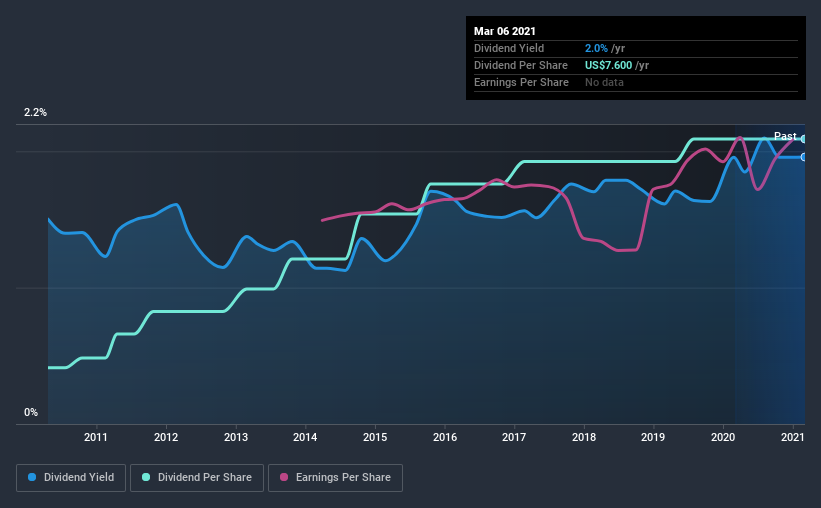NewMarket (NYSE:NEU) Could Be A Buy For Its Upcoming Dividend
Readers hoping to buy NewMarket Corporation (NYSE:NEU) for its dividend will need to make their move shortly, as the stock is about to trade ex-dividend. Investors can purchase shares before the 12th of March in order to be eligible for this dividend, which will be paid on the 1st of April.
NewMarket's next dividend payment will be US$1.90 per share. Last year, in total, the company distributed US$7.60 to shareholders. Based on the last year's worth of payments, NewMarket has a trailing yield of 2.0% on the current stock price of $388.04. We love seeing companies pay a dividend, but it's also important to be sure that laying the golden eggs isn't going to kill our golden goose! So we need to investigate whether NewMarket can afford its dividend, and if the dividend could grow.
See our latest analysis for NewMarket
If a company pays out more in dividends than it earned, then the dividend might become unsustainable - hardly an ideal situation. NewMarket paid out a comfortable 31% of its profit last year. A useful secondary check can be to evaluate whether NewMarket generated enough free cash flow to afford its dividend. Thankfully its dividend payments took up just 44% of the free cash flow it generated, which is a comfortable payout ratio.
It's encouraging to see that the dividend is covered by both profit and cash flow. This generally suggests the dividend is sustainable, as long as earnings don't drop precipitously.
Click here to see how much of its profit NewMarket paid out over the last 12 months.
Have Earnings And Dividends Been Growing?
Businesses with strong growth prospects usually make the best dividend payers, because it's easier to grow dividends when earnings per share are improving. Investors love dividends, so if earnings fall and the dividend is reduced, expect a stock to be sold off heavily at the same time. This is why it's a relief to see NewMarket earnings per share are up 4.8% per annum over the last five years. Earnings per share growth in recent times has not been a standout. However, companies that see their growth slow can often choose to pay out a greater percentage of earnings to shareholders, which could see the dividend continue to rise.
The main way most investors will assess a company's dividend prospects is by checking the historical rate of dividend growth. In the last 10 years, NewMarket has lifted its dividend by approximately 18% a year on average. It's encouraging to see the company lifting dividends while earnings are growing, suggesting at least some corporate interest in rewarding shareholders.
The Bottom Line
From a dividend perspective, should investors buy or avoid NewMarket? Earnings per share have been growing moderately, and NewMarket is paying out less than half its earnings and cash flow as dividends, which is an attractive combination as it suggests the company is investing in growth. It might be nice to see earnings growing faster, but NewMarket is being conservative with its dividend payouts and could still perform reasonably over the long run. It's a promising combination that should mark this company worthy of closer attention.
With that in mind, a critical part of thorough stock research is being aware of any risks that stock currently faces. To help with this, we've discovered 1 warning sign for NewMarket that you should be aware of before investing in their shares.
A common investment mistake is buying the first interesting stock you see. Here you can find a list of promising dividend stocks with a greater than 2% yield and an upcoming dividend.
This article by Simply Wall St is general in nature. It does not constitute a recommendation to buy or sell any stock, and does not take account of your objectives, or your financial situation. We aim to bring you long-term focused analysis driven by fundamental data. Note that our analysis may not factor in the latest price-sensitive company announcements or qualitative material. Simply Wall St has no position in any stocks mentioned.
Have feedback on this article? Concerned about the content? Get in touch with us directly. Alternatively, email editorial-team (at) simplywallst.com.

